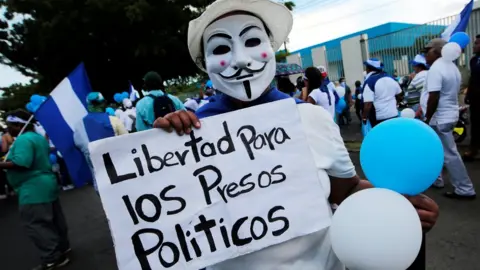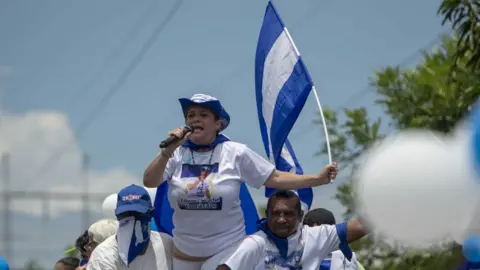Nicaragua crisis: Families march for 'political prisoners'
 Reuters
ReutersFamilies of activists jailed during Nicaragua's anti-government protests have marched in the capital, Managua, to demand their release.
Human rights groups say at least 135 people remain detained following the protests, which began in April.
The protesters say those detained have been illegally arrested and unjustly accused of terrorism.
President Daniel Ortega has denied the detainees are "political prisoners" and has described them as "criminals".
'I won't be silenced'
Carrying balloons in the white and blue of the national flag, the protesters called for those arrested to be released.
Mercedes Dávila, whose son Edwin Carcache was detained on 4 September and accused of leading a "terrorist gang", was among those attending the march in Managua.
 EPA
EPA"They may have kidnapped my son to silence his voice but they didn't realise his mother is a lioness and they will have to kidnap me too, because I won't shut up," she told local media.
Mr Carcache, a student leader, is one of dozens detained on terrorism charges. Human rights groups allege hundreds more have disappeared.
The United Nations Office on Human Rights published a report on 29 August in which it condemned "widespread arbitrary or illegal detentions and enforced disappearances in Nicaragua".
The report also called on the Nicaraguan government to put an end to what it described as "prevalent ill-treatment and instances of torture and sexual violence in detention centres".
Stand-off
Organisers of Sunday's march said they had to change its route after pro-government supporters gathered at its starting point and the two sides traded insults.
Organisers of similar marches in other cities such as León and Masaya said they had been prevented from taking to the streets by groups of pro-government supporters.
The country is deeply divided into those who accuse President Ortega of becoming increasingly repressive during his last 11 years in power and those who remain loyal to him and his left-wing FSLN party.
Clashes between anti-government protesters and pro-government paramilitary groups and the security forces have led to the deaths of hundreds of people.
